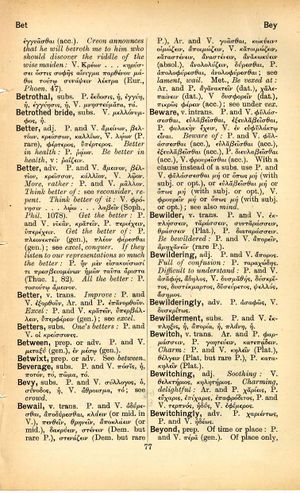bewildering: Difference between revisions
From LSJ
τὸ κακὸν δοκεῖν ποτ' ἐσθλὸν τῷδ' ἔμμεν' ὅτῳ φρένας θεὸς ἄγει πρὸς ἄταν → evil appears as good to him whose mind the god is leading to destruction (Sophocles, Antigone 622f.)
m (Woodhouse1 replacement) |
mNo edit summary |
||
| Line 7: | Line 7: | ||
[[full of confusion]]: [[prose|P.]] [[ταραχώδης]]. | [[full of confusion]]: [[prose|P.]] [[ταραχώδης]]. | ||
[[difficult to understand]]: [[prose|P.]] and [[verse|V.]] [[ἀσαφής]], [[ἄδηλος]], [[verse|V.]] [[ | [[difficult to understand]]: [[prose|P.]] and [[verse|V.]] [[ἀσαφής]], [[ἄδηλος]], [[verse|V.]] [[δυσμαθής]], [[δύσκριτος]], [[δυστέκμαρτος]], [[δυσεύρετος]], [[ψελλός]], [[ἄσημος]]. | ||
}} | }} | ||
Revision as of 15:34, 9 June 2020
English > Greek (Woodhouse)
adjective
full of confusion: P. ταραχώδης.
difficult to understand: P. and V. ἀσαφής, ἄδηλος, V. δυσμαθής, δύσκριτος, δυστέκμαρτος, δυσεύρετος, ψελλός, ἄσημος.

